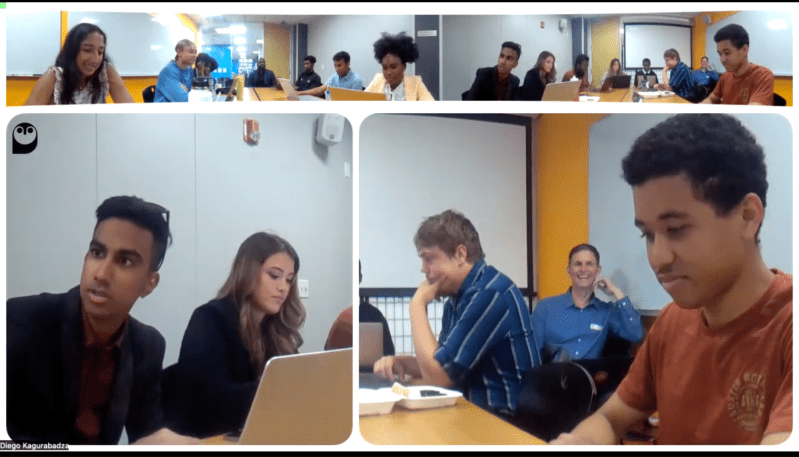The 25th Undergraduate Senate discussed eliminating fees associated with physical wellness courses and reforming campus healthcare to better meet student needs at their fourth and final meeting of the 2022-2023 academic year on Tuesday.
As part of an ongoing discussion around course fees at Stanford, Alex Accetta BA ’92 MA ’93, Executive Director of Recreation & Wellness, Tia Lillie, Director of DAPER Academic Programs and PHYSWELL, and Sue Lowley, Director of Adventure Programs, were present at the meeting to discuss fees associated with enrolling in physical wellness courses.
The speakers came at the invitation of Co-Chair Diego Kagurabadza ’25 as part of the senator’s initiatives addressing fees associated with taking certain courses at Stanford, and how such fees might prohibit students from taking those courses.
Lillie said that on average, their physical wellness courses cost $35, which is not much more than 10 years ago when average costs were $25.
Stanford Recreation and Wellness makes around $110,000 per year from course fees, out of a total programming budget of $8.1 million, according to Accetta. He said that over 1550 students are enrolled in these courses for credits.
In response to questions from multiple senators on why the course fees exist, Accetta said that fees are necessary to make sure that courses are able to maintain equipment or hold field trips.
Despite the important role that course fees play for physical wellness classes, Accetta agreed with the senators that lowering costs would be ideal for students.
“We’re essentially aligned, it’s just a matter of figuring out how to balance a budget, and how the University decides to fund different priorities,” he said.
“It seems that faculty and students all want the same thing, it’s just a matter of budgeting,” Co-Chair Diego Kagurabadza ’25 said. “It might be students really engaging with the University’s budgeting process and asking them to invest more into the wellness programs.”
Accetta also said that Recreation and Wellness’ goals have been changing. Previously, Recreation and Wellness has been focused on “inspiring a healthier Stanford.”
“What we really want to do is create a culture of belonging and well-being,” he said, emphasizing the role he believes physical wellness can play in creating a stronger Stanford community.
As part of this mission, Stanford Recreation and Wellness is also working to help create a streamlined “Farm Games,” which would be friendly intramural neighborhood sports competitions.
“The idea is that these should be quirky, irreverent and fun,” he said. “To help create a sense of Stanford pride.”
Senator Ava Tiffany ’26, was particularly excited at the idea, and suggest that the events could be like “Hogwarts-style” competitions to help generate neighborhood identities.
The senators also discussed Vaden Healthcare reform at Tuesday’s meeting.
Nicolas Garcia ’23, an outgoing president for the Stanford Class of 2023, spoke on the importance of bringing student voices to Vaden’s healthcare operations and the need to establish a Healthcare Oversight Committee.
“We face some of the most expensive student insurance in the Bay Area, on top of one of the most expensive healthcare systems in the United States,” he said. Garcia also stated that Stanford Hospital specifically is one the most expensive healthcare systems in the country.
Ultimately, Garcia said that he hopes that some of the senators can dedicate themselves to establishing the proposed Healthcare Oversight Committee, which would aim to reform Vaden Healthcare by ensuring that student insight can be used to improve how Vaden operates.
“Students do not seem to trust or recommend Vaden at all,” he said, citing a survey the Healthcare Advocacy team conducted in April, which yielded under 250 student responses.
Additionally, he believes that a proposed Vaden Student Healthcare Advisory Council, which would bring student voice to the administration of Vaden Healthcare, would help improve the system for students.
“Our goal really is to create a representative body that can communicate with Vaden and provide essential feedback on the kind of care that we need,” he said. “There is not a lot of information sharing between student leaders and Vaden [right now.]”
Kyle Haslett ’25, ASSU Executive Vice President, said that the ASSU Executive Branch has confirmed their new cabinet members. A resolution to confirm Gabriela Holzer ’25 as the secretary of the 25th UGS was also approved.
The senate also discussed improvements to student life that they hope to make in the next academic year. Kagurabadza lauded the success of Flower Fridays, where ASSU gives students flowers in White Plaza, saying that 750 flowers were given out just last week.
As part of improving student life, Haslett noted that he is currently working with OSE and ResEd on establishing more open late-night spaces on campus in the next academic year. Senator Khandaker Aqib ’25 also said that he is working with R&DE to return a pre-COVID-19 tradition where sports games were televised in dining halls.
